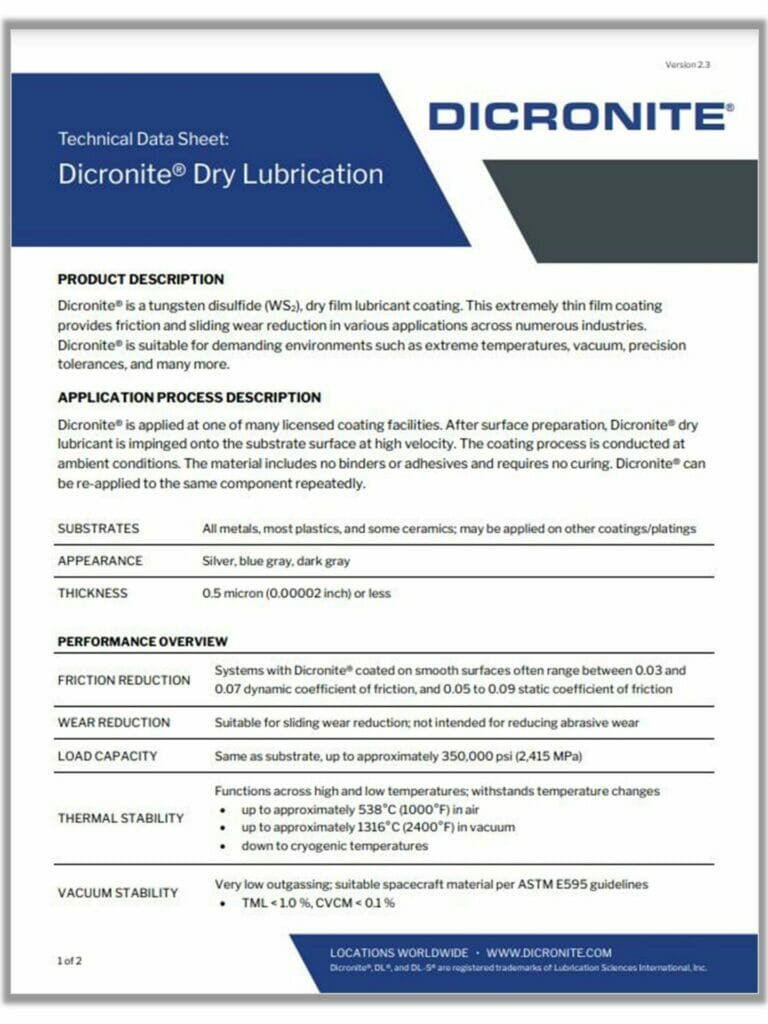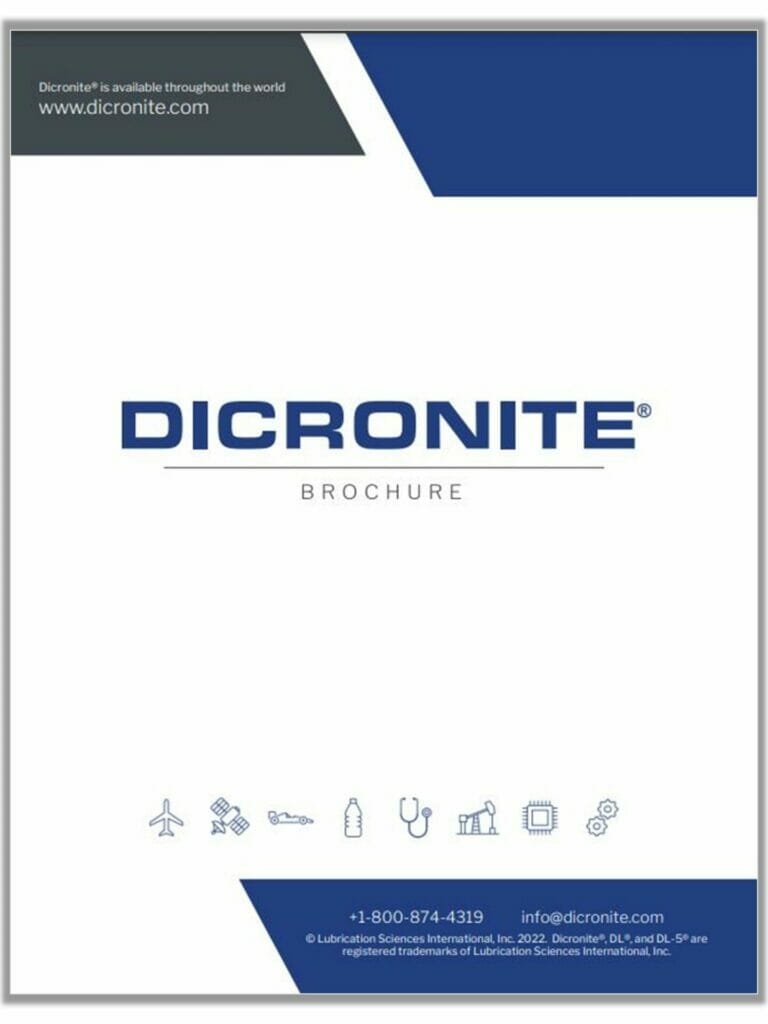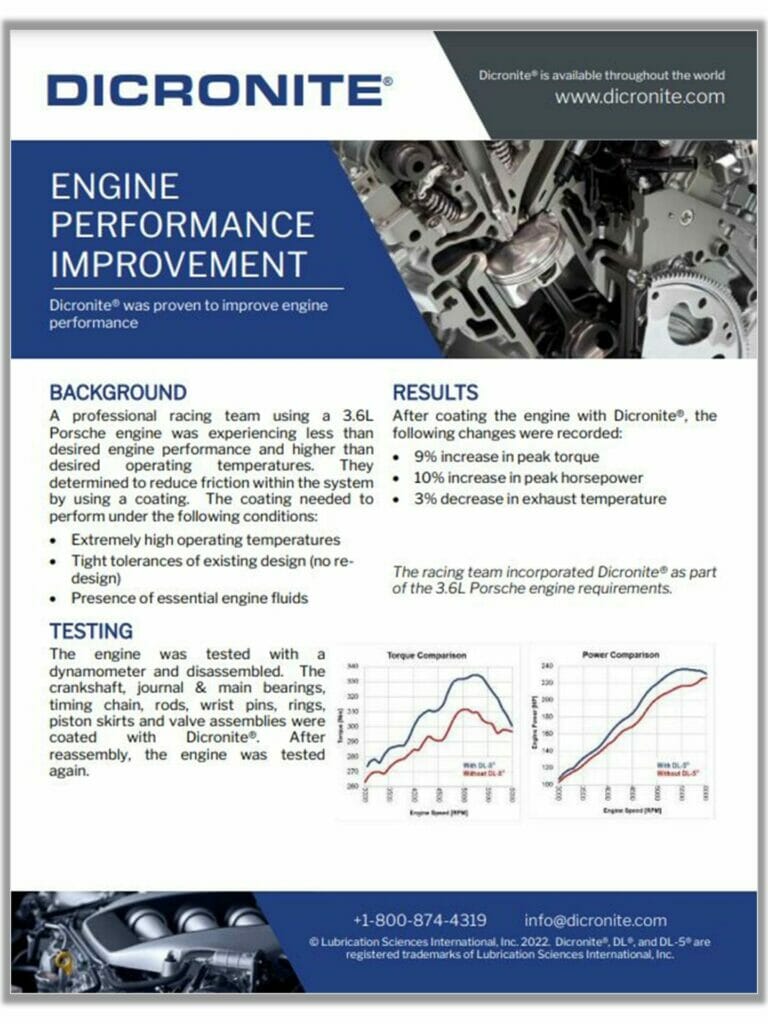Importance of bearings
Bearings play a crucial role in numerous industries by enabling the smooth operation of machinery and equipment. Functioning as mechanical components that facilitate relative motion between different parts, bearings help reduce friction and support loads, ensuring optimal performance and longevity of various mechanisms.
Their importance in industries cannot be overstated, as they are an essential element for smooth and reliable operation in a wide range of applications. To maintain the optimal performance of bearings, the use of suitable bearing lubricants is crucial.
Dicronite® Coating
Bearing failure implications
- DOWNTIME AND PRODUCTION LOSS - Bearing failures often lead to unexpected machinery breakdowns, resulting in costly downtime. Production processes may come to a halt, causing delays in manufacturing and delivery schedules. The loss of productivity can have a ripple effect on the entire supply chain and impact business operations.
- INCREASED MAINTENANCE AND REPAIR COSTS - Bearing failures necessitate immediate repairs or replacements, which can be costly. In addition to the expenses associated with acquiring new bearings, there may be additional costs for labor, equipment, and potential damage caused by the failure. Regular maintenance and inspections are essential to identify and address bearing issues early on, reducing the risk of failure and mitigating financial implications.
- SAFETY RISKS - Bearings failing during operation can pose safety risks to workers and equipment. Catastrophic failures may result in accidents, injuries, or damage to surrounding machinery. In industries where heavy equipment or rotating machinery is involved, such as manufacturing plants or construction sites, bearing failures can have severe consequences for the well-being of personnel and the overall workplace safety.
- DECREASED EQUIPMENT LIFESPAN - Bearings act as protective components, preventing direct contact between moving parts and reducing friction. When bearings fail, it leads to increased wear and stress on other components. This accelerated wear can result in premature failure of other critical machine parts, shortening the overall lifespan of the equipment.
- REDUCED EFFICIENCY AND PERFORMANCE - Failed or poorly performing bearings can negatively impact the efficiency and performance of machinery. Increased friction and heat generation due to faulty bearings lead to energy losses and reduced operational effectiveness. This can result in decreased output, higher energy consumption, and compromised product quality, affecting the competitiveness of businesses.
Industries Served
The importance of a bearing lubricant
A bearing lubricant is of utmost importance in ensuring the reliable and efficient operation of bearings.
It serves as a vital protective barrier, reducing friction, dissipating heat, and maintaining the overall performance and integrity of the machinery.
Choosing the right lubricant and adhering to regular maintenance practices are crucial for maximizing bearing performance and minimizing risks, making bearing lubrication an indispensable element in industrial operations.
Various types of bearing lubricants
| Lubricant | Summary |
|---|---|
| Grease | Grease is a semi-solid lubricant consisting of a base oil, thickeners, and additives. It has a higher viscosity compared to oil, which allows it to stay in place and provide long-lasting lubrication. Grease is often used in applications where continuous re-lubrication is not practical or feasible. It provides good sealing properties, protects against contaminants, and offers excellent load-carrying capabilities. |
| Oil | Oil lubricants are liquid lubricants with various viscosity levels. They can be mineral-based, synthetic, or a blend of both. Oil lubrication allows for efficient heat dissipation and provides low starting torque. It is commonly used in high-speed applications where oil circulation systems or oil bath lubrication methods are employed. Oil lubrication offers excellent cooling properties and can be tailored to specific application requirements by selecting the appropriate viscosity grade and additives. |
| Dry Lubrication | Solid lubricants, such as graphite, molybdenum disulfide (MoS2), polytetrafluoroethylene (PTFE), or tungsten disulfide (WS2) are dry lubricants that work by creating a thin film on the bearing surfaces. These lubricants have a low coefficient of friction and are often used in applications with extreme temperatures, high loads, or in environments where liquid lubricants may not be suitable. |
The selection of the appropriate lubricant type depends on various factors, including the bearing type, operating conditions (such as speed, temperature, and load) and environmental factors.
Dicronite® as a bearing lubricant
Dicronite® is a dry film lubricant (tungsten disulfide WS2) that has been used as a bearing lubricant in various industries and high precision applications.
- Can withstand extreme temperatures (-188°C to +538°C) and vacuum environments.
- Has a maximum thickness of 0.5 micron and won't affect precision tolerances.
- The coating won’t attract dirt or debris like typical wet lubricants.
- Load capacity is the same as substrate, up to approximately 350,000 psi (2,415 MPa).
- Is effective alone or as a co lubricant.
How can we help you make your decision?
While there are various types of bearing lubricants available, we at Dicronite® specialize in providing a comprehensive tungsten disulfide coating service. Our coating exhibits unique properties that effectively reduce friction in a wide range of high precision bearing applications.
Dicronite® offers exceptional performance and durability. While it may not be suitable for every bearing application, our team of experts is dedicated to understanding your specific needs and objectives in incorporating a solid film lubricant into your bearing design. We are here to provide further guidance and assistance in determining the most suitable lubrication solution for your requirements.
Speak to an expert today. We can help conduct a trial coating or point you in the right direction.

High precision bearing lubricant for 65+ years.
Dicronite® is a dry film lubrication made up of tungsten disulfide.
It can be applied to all metals, most plastics and some ceramics; may be applied on other coatings and platings as well.
COATING THICKNESS – 0.5 micron (0.00002 inch) or less
THERMAL STABILITY – up to 538°C in air; 1316°C in vacuum
COMPATIBILITY – compatible with greases, oils, fuels, fluids, and many solvents.
Dicronite® is applied at one of many worldwide licensed coating facilities.
After surface preparation, Dicronite® is impinged onto the surface at high velocity.
The material includes no binders or adhesives and requires no curing.
All you have to do is:
- Tell us about your application
- Send components to one of our application facilities
- Receive your expertly coated parts with little lead time.
Dicronite® has various application facilities that can provide the following quality certifications:
NADCAP
ITAR
ISO9001
AS9100
Submit an official quote today.
Wanting to improve performance of bearings with dry lubrication?
Our experts are here to help.


